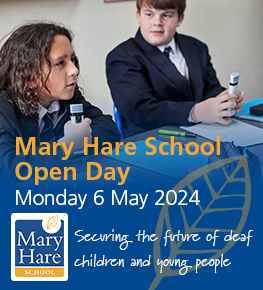A member is concerned that ToDs in services ‘should have’ rather than ‘must have’ the MQ
The wording in the Code of Practice carries some nuances. ‘Must’ is statutory and can be legally challenged. This is the strongest term used in the Code and signals those items that can be legally challenged if not present. In the case of advisory/peripatetic teachers who ‘should also’ hold the qualification, whilst not as direct as ‘must’, is clear that these teachers have to be suitably qualified. The reason for ‘must’ and ‘should’ is because the regulations requiring the MQ only technically apply to schools – hence the application of the requirement to resource bases and special schools. In a school for the deaf, where the teacher ‘must’ be qualified, it is likely that any unqualified teacher be mentored by a qualified ToD, would not be teaching a class at all times and would be in training to gain the MQ.
It may be helpful also to draw attention to part xix of the Equality Act 2010 pages 16 and 17:
The Equality Act 2010 sets out the legal obligations that schools, early years providers, post-16 institutions, local authorities and others have towards disabled children and young people:
- They must not directly or indirectly discriminate against, harass or victimise disabled children and young people
- They must not discriminate for a reason arising in consequence of a child or young person’s disability
- They must make reasonable adjustments, including the provision of auxiliary aids and services, to ensure that disabled children and young people are not at a substantial disadvantage compared with their peers. This duty is anticipatory – it requires thought to be given in advance to what disabled children and young people might require and what adjustments might need to be made to prevent that disadvantage
A Qualified Teacher of the Deaf, or an appropriately supervised ToD in training, is considered an auxiliary aid in terms of the Equality Act.
Accessing early support (SEN Code p 82): From birth to two – early identification
5.16 This support can take a number of forms, including:
- specialist support from health visitors, educational psychologists, speech and language therapists or specialist teachers, such as a teacher of the deaf or vision impaired. These specialists may visit families at home to provide practical support, answering questions and clarifying needs
Involving specialists (SEN Code p 183):
6.16 Schools should work closely with the local authority and other providers to agree the range of local services and clear arrangements for making appropriate requests. This might include schools commissioning specialist services directly. Such specialist services include, but are not limited to:
- educational psychologists
- Child and Adolescent Mental Health Services (CAMHS)
- specialist teachers or support services, including specialist teachers with a mandatory qualification for children with hearing and vision impairment , including multi-sensory impairment, and for those with a physical disability. (Those teaching classes of children with sensory impairment must hold an appropriate qualification approved by the Secretary of State. Teachers working in an advisory role to support such pupils should also hold the appropriate qualification.)
- therapists (including speech and language therapists, occupational therapists and physiotherapists)
And this part is key:
Advice and information for EHC needs assessments (SEN Code p 156)
Relevant legislation: Section 36 of the Children and Families Act 2014 and Regulations 6, 7, and 8 of the SEND Regulations 2014
- If the child or young person is either vision or hearing impaired, or both, the educational advice and information must be given after consultation with a person who is qualified to teach pupils or students with these impairments
Teachers of the Deaf are often specified in an Education, Health and Care (EHC) plan. An EHC Plan must specify the special educational provision that a child requires. This legal requirement has been confirmed in the Upper Tribunal decision B.M & B.M v Oxfordshire CC (SEN) [2018] UUT35 (AAC).
Also it is important to remember that Teachers of the Deaf are often called upon to give SEN expert advice. Where experts conflict in their advice it is important that the First Tier Tribunal considers this appropriately.
Guidance from the Upper Tribunal has been published http://administrativeappeals.decisions.tribunals.gov.uk. The guidance for how expert evidence should be considered by the Special Educational Needs and Disability Tribunal is found in the case of The Royal Borough of Kensington and Chelsea v CD [2015] UKUT 0396 (AAC).
So, yes – essentially, all teachers teaching and supporting the educational provision for deaf pupils should, and must, be qualified as advised by the SEN Code and Equality Act.




